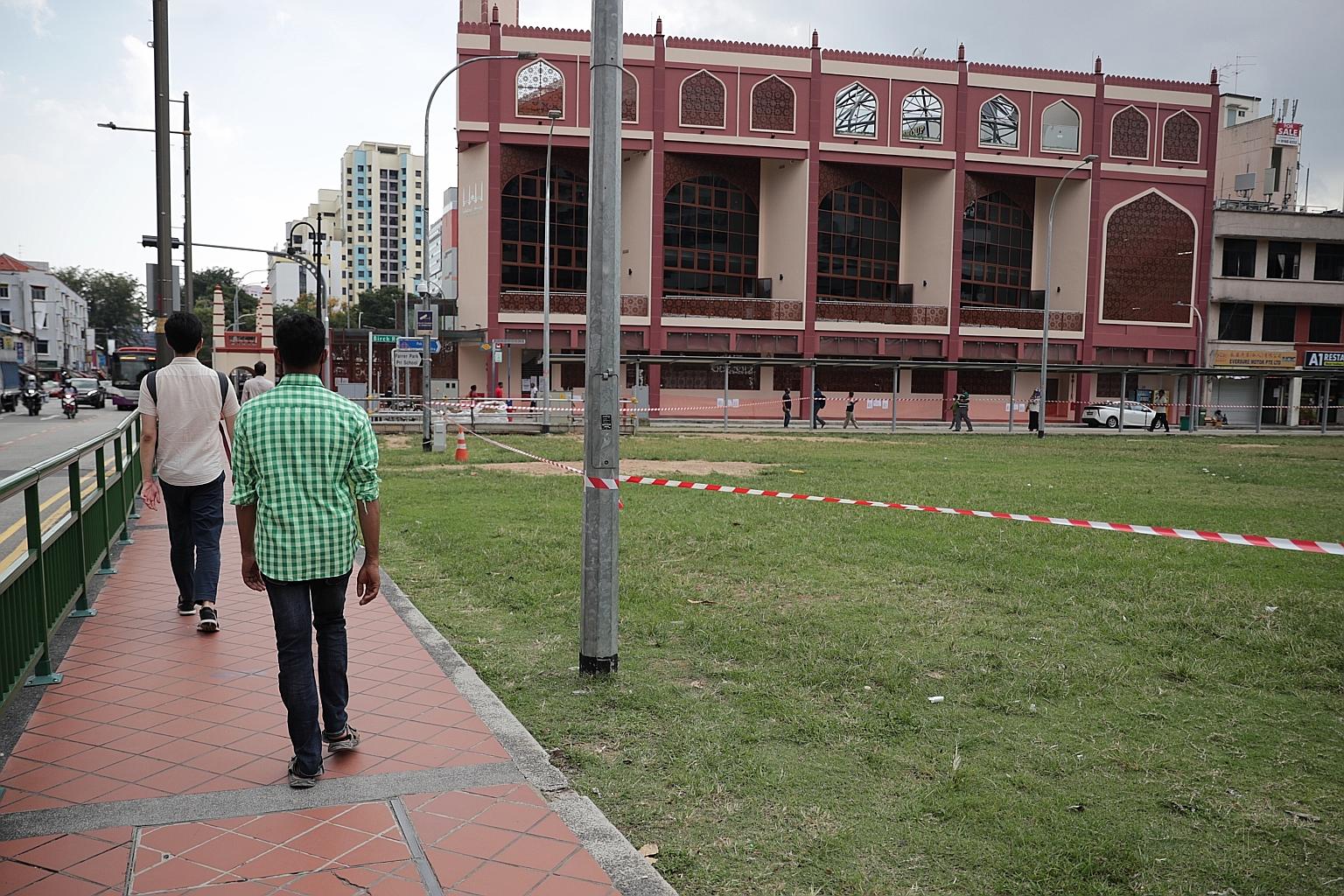Coronavirus pandemic
Migrant workers stay away from usual hangouts
But markets, food centres still bustle with S'poreans despite stricter distancing rules
Sign up now: Get ST's newsletters delivered to your inbox

An open field near Angullia Mosque in Little India, where foreign workers usually gather, lay empty after being cordoned off by Manpower Ministry officers yesterday.
ST PHOTO: GIN TAY
Public spaces usually filled with the chatter of migrant workers were silent even as markets and hawker centres buzzed with Singaporeans on the first Sunday since stricter distancing rules kicked in.
Visits by The Straits Times yesterday to places frequented by foreign workers found only sparse and small groups, if any. A reason could be the increased presence of Ministry of Manpower (MOM) officers recently.
MOM had said last Wednesday that it was ramping up efforts to disperse large public gatherings and might even revoke the work passes of workers who did not comply.
Yesterday, the third consecutive Sunday of operations, MOM tripled the number of officers to 130 from 40 the previous week. The efforts, aided by police and Migrant Workers' Centre (MWC) staff, seem to have yielded results.
A field beside Kallang MRT station, a popular meeting spot for domestic workers on weekends, was almost empty when ST visited at around 12.30pm.
A senior MOM official said the operations have helped to educate workers on the new rules, including those banning gatherings of over 10 people and on the need to stay at least a metre away from others.
"We are heartened to see that our messaging on stricter social distancing has worked well," said Ms Jeanette Har, director of well-being at MOM's foreign manpower management division.
Officers were armed with materials on the rules and observing public hygiene in different languages such as Tagalog and Bahasa Indonesia when they visited the Kallang field, which had only three or four small groups of foreign domestic workers (FDWs).
Ms Rishma, 30, from Bandung, Indonesia, said her employer encouraged her not to be cooped up at home, while taking precautions.
She did not share food, utensils or drinks with her two friends, and sat more than 1m apart from them. But this did not stop officers from asking her to pack up and go home.
Ms Har said picnics tend to result in groups eventually sitting closer and sharing food. MOM's advisories also state that FDWs and foreign workers should minimise time outside apart from essential errands.
Said Ms Rishma, who has worked here for seven years: "After working for a full week at home, the feeling is quite 'down' when we have to stay at home."
Ms Catherine James, executive director of migrant group Humanitarian Organisation for Migration Economics, said: "The situation can be resolved by clear communication and offering FDWs a real option to rest and unwind at home."
For example, employers can offer a guest room or include their helper for online food orders.
Bangladeshi and Indian workers were also largely absent from their usual spots yesterday.
At about 4pm, ST found that fields in Little India where they would gather, such as those near Park Hotel Farrer Park and Angullia Mosque, had been cordoned off by MOM officers after 2pm. About 20 officers and MWC volunteers were seen around the now-empty fields.
Mr Ethan Guo, general manager of Transient Workers Count Too, said that like locals, migrant workers too have no desire to catch the virus or be accused of spreading it.
Yet migrant workers face inspectors while locals get "ambassadors", he noted wryly.
It was a reference to efforts like the SG Clean Ambassadors Network launched yesterday by Senior Minister of State for the Environment and Water Resources Amy Khor at a Bukit Batok West coffee shop. These ambassadors will go to hawker centres and coffee shops to guide patrons on safe distancing, among other measures.
The SG Clean ambassadors may have their work cut out for them, as Tekka Market was bustling with activity yesterday, with Singaporeans crowding around wet market stalls.
Madam Salma Begam, 53, said shopping there was a weekly ritual.
"There are some spices and ingredients that I can buy only here. I can't get them in supermarkets."
Patrons at the Tekka hawker centre tried to maintain their distance.
Most at Yishun Park Hawker Centre did too, but there was no distancing in queues at some stalls, and some were unsure whether families and couples could sit close together.
Retired supermarket cashier Christina Lim, 64, was eating there with her husband William Wee, 65, yesterday. She said: "We see markings on the seats here, so we decided to just sit apart even though we came here together."
At the launch event, Dr Khor said while safe distancing measures may be inconvenient, they are key to reducing the spread of Covid-19. Encouraging patrons to take away food to avoid crowds, she added: "It's actually for your own safety."
- Additional reporting by Yuen Sin


